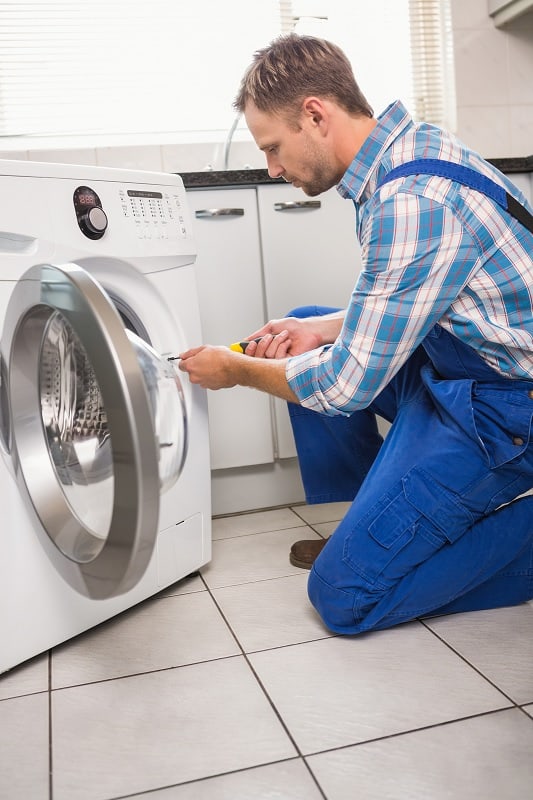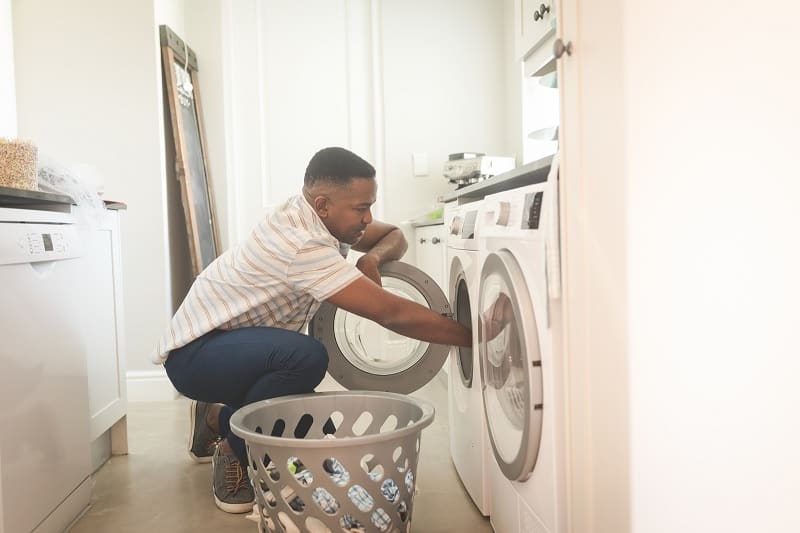No one wants to spend their days handwashing laundry, and so washing machines are a crucial appliance. That means there’s nothing worse than when your washing machine breaks down.
The exact length of time a washing machine is expected to last can be affected by how the machine is used, how it is maintained, and even the specific model as some models or brands may have different life expectancies.
Average Washing Machine Lifespan
In the past, washing machines could easily last ten years or even longer before giving up and breaking completely. Older machines were built to last and to keep up with demanding families.
Modern machines however, due to differences in construction, features, and ease of repair, typically last an average of six years before they need to be replaced.
The exact expected lifespan will still vary depending on brand and model, with some more expensive models lasting closer to ten years, and some low-end, budget models only lasting a couple of years before either needing either a repair or replacement.
Tips for Extending a Washing Machine’s Lifespan
By taking after your washing machine, you can help to extend its lifespan, and reduce the chances that you will need to pay out for expensive repairs.
Most of these tips are quick and simple, and just by spending a few minutes here and there and planning your laundry loads, you could stand to save yourself a great deal of money in the long term.
1. Regular cleaning
Without regular cleaning, the washing machine’s components can all end up clogged up with dirt and debris. This can lead to nasty marks on laundry, and if left to build up, it can damage components as well.
To avoid this problem, regularly clean the washing machine. Some machines will have a dedicated cycle designed for this exact purpose, but if yours doesn’t, simply run an empty, hot cycle with white vinegar or citric acid to break through the grime. Regardless of the cycle you use, make sure to leave the washing machine’s door open to let it dry thoroughly without the water becoming stagnant.
Ideally, you want to run a maintenance cycle once a month.
2. Avoid over or under loading
Every washing machine has a recommended load or capacity, and this is in place for a reason.
Overloading a washing machine can lead to extra wear and tear on the motor, belts, and other parts.
This can cause damage to components or result in leaks. In addition, overloading can prevent washing from cleaning properly as clothing will bunch up and will not be able to move freely.
Underloading the machine might not seem like a problem, but it will often leave you with an unbalanced load.
Not only does this tend to make the machine quite loud whilst it is running, but it can also put extra strain on components, and it wastes both energy and water too.
If you need to run a smaller load than the maximum your washing machine is rated for, check the programs available to you as many machines will have cycles specifically designed to safely tackle half loads of laundry.
3. Check pockets
Before starting a load, make sure that you check the pockets and any folds of clothing to find any coins, screws, pens, or any other random items left behind. Empty the pockets before putting your clothes in the machine.
Running a washing machine cycle with unexpected objects included can lead to damage inside the drum or worse.
4. Level the machine
If a washing machine does not sit level when in use, it can vibrate unevenly, leading to wear on the components, or damage to anything near the machine.
If the floor where your machine is sitting is uneven, adjust the machine’s legs to raise or lower each corner of the machine.

When Should You Replace a Washing Machine?
We all want to avoid spending more money than is strictly necessary. However, there are times when it is better to replace a washing machine than keep paying out for repairs time and time again.
If you have found yourself paying for the same or similar repairs to a washing machine time and time again, it is probably worth investing the extra upfront and buying a new washing machine.
Small repairs such as seals or detergent drawers are simple and relatively cheap, however if you find that bigger components, such as the drum or motor need replacing, it may become more economical to replace the appliance.
You should compare the cost of repairing a washing machine to the cost of replacing it with a similar model.
If the cost of the repairs is more than half the price of the new machine, you should seriously consider whether just buying a new one is a better choice.
If the cost of the repair is less than half the price of the new machine, it is most likely worth just opting for the repair.
As well as potentially saving money on repairs, you will also find that newer washing machines can offer better performance than your old one, and they tend to be much more efficient too, saving you even more money on both water and electricity.
Newer models of washing machine also tend to be much more efficient, saving money on your electricity bills.
If you find yourself using a lot of water or electricity just to wash your laundry, consider investing in a more up-to-date model.
If you’ve decided it’s time to replace your machine, see our list of the best washing machines in the UK.

Lover of coffee, painting, and all things cute and fluffy. I’m always on the lookout for easier, more gentle ways to tackle awful household chores.






